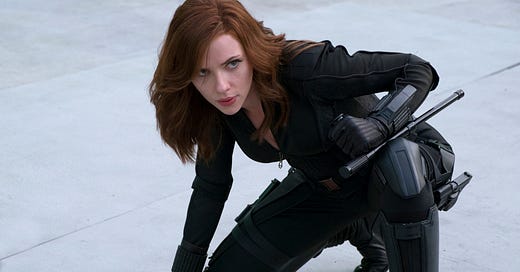Is 'Black Widow' An Anti-Male Feminist Movie From Hell?
Does it 'force men to squirm while putting them in their place?'
Here’s IndieWire on Twitter:


And here’s the relevant quotation from an otherwise pretty decent review of Black Widow:
Needless to say, the movie does a far better job than the rah-rah inclusivity gesture at the end of “Endgame” to play up its feminist leanings. “Black Widow” not only passes the Bechdel Test; it forces men to squirm as it puts them in their place. (One standout bit finds the women neutralizing their annoying adopted dad with period talk.)
I’ve seen Black Widow. It’s fine. It’s not great, it’s not terrible. You can read my review over at Forbes. I critique its length and pacing mostly; its generally boring plot and shallow characters. I praise its action scenes and brutal fight scenes. It’s just a perfectly average MCU movie overall. Nothing special, nothing terrible. Kind of like the MCU itself—generic and samey but still fun.
One thing I absolutely did not think to myself while watching it is that the film “forces men to squirm as it puts them in their place.” I was not squeamish after watching it. Nor—as a man with plenty of women in his life—do I find discussion of menstruation gross or “neutralizing.” So you bleed and get cramps and have mood swings. I’m sorry about that, God is kind of a dick, but I’ll pick up some tampons while I’m the store if you need them. Just don’t flush them down the toilet and we’re cool.
It’s funny. This line paragraph written as a positive, as if “putting men in their place” is the goal of feminism, or ought to be the goal of feminism. Make men squirm, shut them down with period conversation, yay feminism! Are we all equal yet? Anti-feminists on the right will no doubt join in the chorus of stupidity and say much the same thing but from the opposite vantage. Oh look at this feminazi movie about “putting men in their place!” Honestly, dearest readers of mine, it does nothing of the sort. It’s not a politically charged film unless you’ve gotten too thin-skinned and are triggered by everything.
Sure, the bad guy is a white dude. So are lots of bad guys in lots of movies. Sure, it passes the Bechdel Test (wherein a movie must have more than one female character and they must converse amongst themselves about something other than a man) but so do lots of movies these days. It’s a bit antiquated, no?
Oddly enough, framing the movie this way—as feminist, or empowering, because it makes men uncomfortable, is a kind of Bechdel Test fail. It suggests that the only way these women can be badass is by putting men in their place—as though badass women can only be badass if they’re comparatively badass compared to the men they interact with. Horseshit. Black Widow was badass when she and Steve Rogers were on the run. She’d be badass all by her lonesome fighting against alien bugbears. She doesn’t need a man to be badass and she doesn’t need to put a man in his place to be badass, either. I have said badass too many times at this point and I am deeply, deeply apologetic.
(Side note, this is kind of like saying that the only way we can frame the struggles black people face in America is through the lens of white privilege. That’s also horseshit. That link points to an excellent article by Cathy Young that I want to highlight in a separate post. She makes too many great points to stick it in here where it doesn’t really belong).
Anyways, I find this entire line of criticism deeply off-putting and counter-productive. Criticism—like art—doesn’t have to be bereft of politics. We should absolutely bring our political knowledge and views, religious beliefs and so forth with us when we sit down to write a critique or a story or a script or whatever. But when the art/criticism becomes subservient to ideology it loses something. A critic must rise above politics and personal biases, at least to some degree, in order to get at the heart of the matter—how it ticks, why it works or doesn’t work, what its qualities and shortcomings may be, whether it’s worth our time and money. We can’t focus entirely on ideological concerns all the time or we do ourselves and our readers/viewers/fans/audience a massive disservice. We trade the universal for the narrow, and deep-thinking for shallow politics du jure.
I think often of Roger Ebert’s review of The Last Boy Scout. I think it’s a pretty great example of Ebert struggling to reconcile his distaste for the movie’s vulgarity and violence and what he perceived as misogyny, against its obvious qualities as an action film. He concluded:
“The Last Boy Scout” is a superb example of what it is: a glossy, skillful, cynical, smart, utterly corrupt and vilely misogynistic action thriller. How is the critic to respond? To give it a negative review would be dishonest, because it is such a skillful and well-crafted movie. To be positive is to seem to approve its sickness about women. I’ll give it three stars. As for my thumb, I’ll use it and my forefinger to hold my nose.
Here we have a skillful weaving of objectivity and subjectivity—something not every critic is able to achieve—that allows Ebert to praise the film while also holding his nose. It’s a remarkable talent, and one that our current crop of ideologically driven critics and wannabee Twitter critics could learn a lesson or two from.
In any case, I talk about the problems with the IndieWire review in my latest YouTube video. Thanks for reading (and watching) oh thou wondrous folk. Enjoy:
Follow me on Twitter and Facebook. You can support my work on Patreon or Substack, and subscribe to my YouTube channel here.





sometimes, i just want to be entertained w/o having to meta-analyze my own psyche and it's relationship (or mis-alignment?) with "pop culture" and twitter-shit... is that too simple? maybe i'm basic.
It's this creepy obsession progressive critics have with claiming ownership over pop culture. They can't reconcile sharing their love for a movie with undesirables (believing it to be a reflection on them), and assert heavy-handed messaging that isn't in the actual movie to exclude such people. As a rational full-grown adult who's secure in myself, I would never tell somebody with an opposing political viewpoint that they can't enjoy something I also enjoy. I'm not going to freak out just because a bona fide Klan member likes Star Trek, as if that puts my love for the series in jeopardy until I perform the mental gymnastics required to exorcize him from the fanbase.